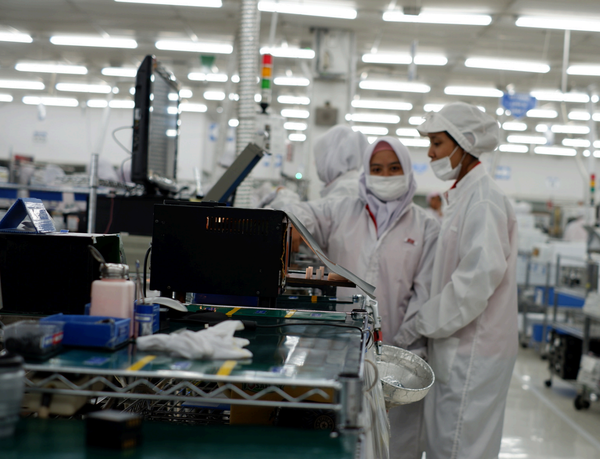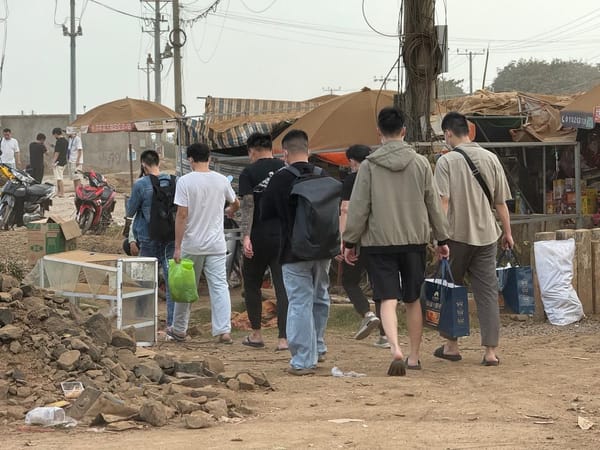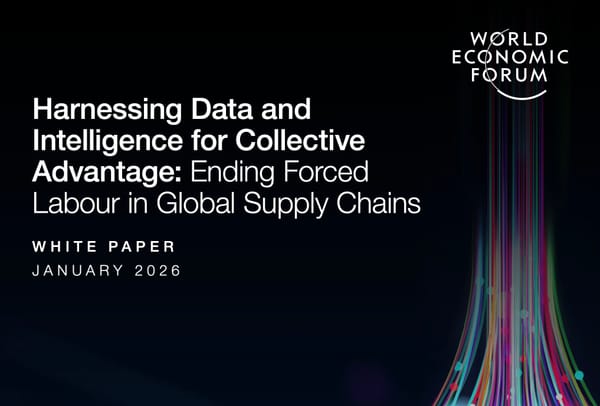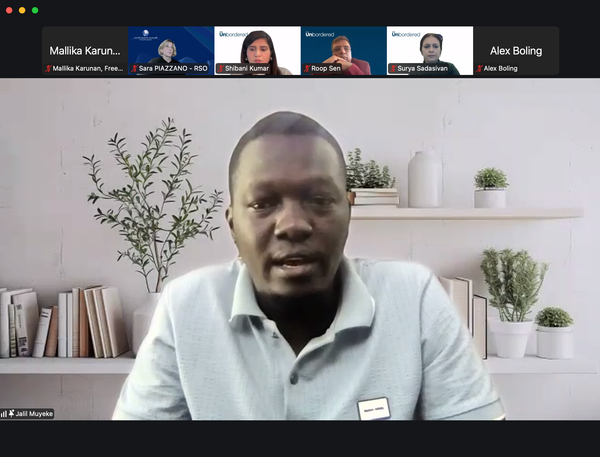A new report examines state involvement in Cambodia’s cyber-fraud industry
Cambodia’s state-cybercrime nexus poses a threat to global security, human rights experts condemn violence against women and girls in Sudan, and Sierra Leonean migrants are increasingly being trafficked to the Middle East.
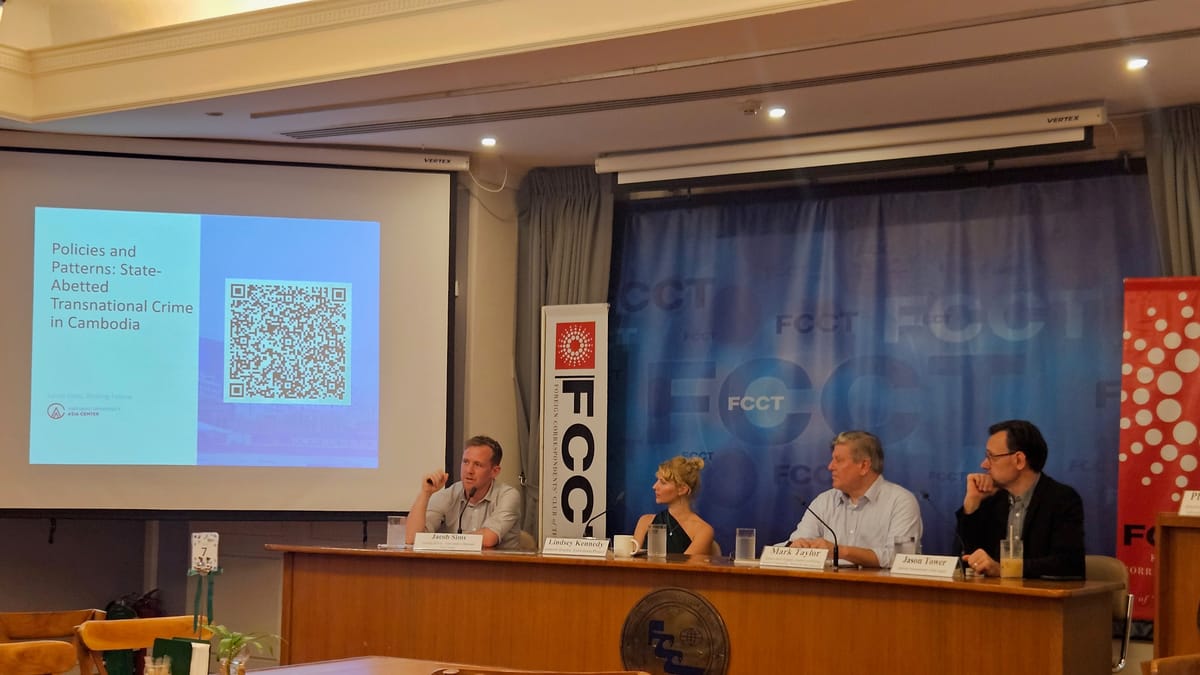
A newly released report highlights the significant global security risks posed by the online fraud industry and the structural role of the Cambodian Government in sustaining and protecting it. Policies and Patterns: State-Abetted Transnational Crime in Cambodia as a Global Security Threat, authored by Jacob Sims, published by Humanity Research Consultancy, and funded by the U.S. Government, looks at how the situation emerged, why it has been able to withstand reform attempts, and the policy measures that could be effective against it.
As well as exploring the enabling environment in Cambodia that has allowed the cybercrime industry to flourish, the study also scrutinizes China’s complex dual role as both a key enabler and powerful disruptive force, maps the relevant interconnections between Cambodia’s gambling, financial, telecommunications, and security sectors, and surveys the vastly divergent responses of the international community. Notably, it provides a comprehensive taxonomy of the observable mechanisms and functions of state involvement in the industry, offering a framework for ongoing investigations into the intersection of state power and cybercrime in Cambodia and other contexts.
Transnational organized cybercrime is currently the world’s fastest-growing illegal industry, with conservative estimates placing the annual revenues of scam syndicates at between US$50 billion and US$75 billion – around 40 to 60 per cent of total GDP in Cambodia, Myanmar and Laos. The overwhelming consensus among experts and supporting evidence is that, in Cambodia, endemic corruption, reliable state protection, and collusion by political elites are the principal enablers of this phenomenon, while these factors also represent the main obstacles to efforts aimed at curbing the industry’s rapid growth, the report states.
The global expansion and dominance of this illicit economy now present serious security threats that far exceed the massive financial losses incurred by scam victims, says Sims. The circulation of illicit proceeds is increasingly infiltrating global financial markets, while China’s opaque involvement as well as the mode of its law enforcement response are subverting international norms and raising geopolitical concerns. Furthermore, the unprecedented centrality of the state-crime nexus in Cambodia exposes fundamental weaknesses in traditional diplomatic approaches to achieving foreign policy objectives and maintaining domestic security.
Nonetheless, Cambodia is currently a tale of two “communities” in the response to this challenge, the report says. The international community, comprising well-funded anti-trafficking non-governmental organizations, bilateral development agencies, and international organizations, has largely been ineffective in disrupting the criminal ecosystem in Cambodia, given its reliance on relationships with compromised officials and its commitment to reform ideals incompatible with Cambodia’s existing political environment. Meanwhile, Cambodia’s local civil society community, including grassroots volunteer networks, human rights organizations, and independent media, has emerged as the central force resisting this criminal system. Despite limited resources and frequent repression, these poorly funded groups remain the primary sources of credible information on key perpetrators, their networks, and their modes of operation.
These same civil society actors, however, are also the most susceptible to funding reductions and suspensions and bear a disproportionate burden of the legal and physical risks which have long been a reality in Cambodia but are now escalating rapidly. A planned interview with Cambodian government officials for the report was canceled following a risk assessment, Sims said at the report launch, which was hosted last week by the Foreign Correspondents’ Club of Thailand (FCCT). At the same event, Lindsey Kennedy, research director at The EyeWitness Project, remarked that this suppression and the ongoing drive to shut down the media and any civil society presence in Cambodia makes anti-trafficking work and other efforts to counter transnational crime almost impossible. Observers further noted that panelists from the launch event are currently unfunded due to the fallout from the USAID funding freeze.
Given the unworkability of immediate domestic reforms within Cambodia, and the substantial security risks posed by the prevailing situation, the report’s principal recommendation is for the international community to swiftly initiate a coordinated harm-reduction strategy targeting the nexus between the Cambodian Government and the cybercrime economy. This strategy would necessitate the mobilization of a broad coalition across interagency and intergovernmental bodies to contain the transnational fallout from the Cambodian regime’s predatory activities, the report says, using a range of unilateral and multilateral interventions.
Here’s a roundup of other noteworthy news and initiatives:
A group of independent human rights experts have strongly condemned the widespread and systematic violations committed against women and girls in Sudan, including conflict-related sexual violence, abductions, trafficking and killings, many of which have been attributed to the Rapid Support Forces (RSF). The experts also expressed alarm at the continued attacks on women human rights defenders and frontline workers, who have reportedly been raped, killed, or harassed for assisting survivors or documenting abuses, and called for the international community to step in.
A report from the Global Initiative Against Transnational Organized Crime has found evidence of misleading recruitment practices and repressive working conditions within Alabuga Start, a recruitment program connected to Russia’s Alabuga Special Economic Zone, where attack and reconnaissance drones are produced for the Russian military. The program reportedly relies on young migrant women to staff its production facilities, many of whom believe they are joining a work-study program, and the report calls for further investigation and greater prevention and protection measures.
This blog post from Corporate Accountability Lab describes the recent case against U.S. company Bumble Bee Foods regarding forced labour and human trafficking at sea, and provides an overview of the risks of human rights abuses in the fishing industry and Bumble Bee’s failures to mitigate them. It describes the case as a big step forward for accountability in the tuna industry and expresses hope that, as demand for social accountability increases, the culture of impunity from which food companies profit will diminish.
And this article, from Beyond Trafficking and Slavery (BTS), asks how the anti-trafficking field has evolved over the past 10 years and where it appears to be heading. It explores preoccupations, blind spots, and prejudices, the ways in which the sector undermines its messages and how it could do better, and reflects on BTS’s founding belief that moving beyond trafficking and slavery requires focusing on economic and political systems rather than individual criminals.
Sierra Leonean migrants seeking better lives abroad are increasingly being caught in a web of forced labour masked as work-abroad programs in the Middle East. Disproportionately affected by the country’s chronic economic challenges, Sierra Leone’s youth are targeted by fake recruitment agents and unregistered agents to work for exploitative employers in the Middle East or other West African countries, often ending up in situations of human trafficking, unpaid labour and other exploitation.
The International Organization for Migration is seeking an Online Platforms Toolkit & Research Consultant, reporting to the Transnational Crime & Technology Programme Manager at The Regional Support Office of The Bali Process.

